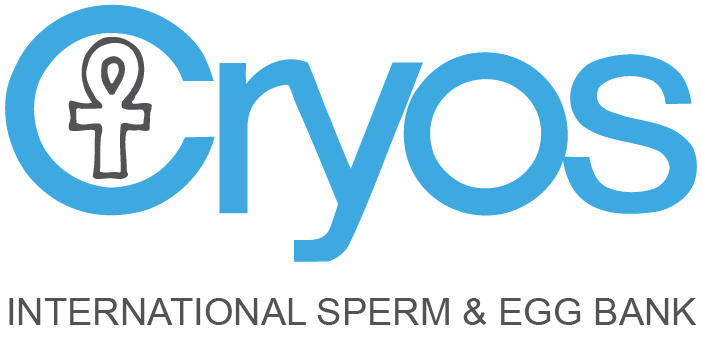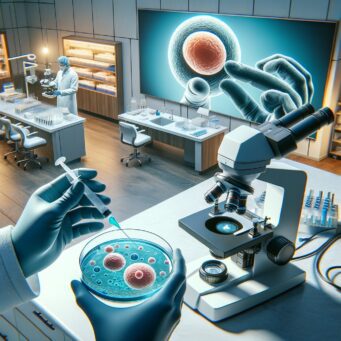
Presented by Cryos International/USA
When you think about having a family using donor sperm or donor eggs, the biggest question you might have is: Will it really be my child?
You want a child that will be “a chip off the old block,” but all the unknowns involved in using a stranger’s donor sperm or eggs may make you uneasy.
Luckily, the possibilities of finding a happy match are growing as sperm and egg banks expand options and improve preservation techniques.
Corey Burke, Executive Vice President and Tissue Bank Director at Cryos International (USA), says: “I love helping people achieve their dreams, helping them get pregnant. It’s a great thing to help them along their path to parenthood.”
Cryos has the world’s largest collection of sperm and egg donors in the world. The bank has been helping people find their donor sperm match for more than 30 years and egg donors for more than five. (The commercial industry for egg freezing has been around for only eight years).
Though customers may start out as desperate to have a family (after years of infertility) or unsure (single women or men or same-sex couples without options), many ultimately become overjoyed parents.
Will the Child Be Like Me?
Dr. Lucy Hutner, a reproductive psychiatrist in New York, works with many people in those early days of indecision and anxiety over using a donor.
She coaches patients struggling to reconcile having a child not biologically related to them to see using donor sperm or eggs as a positive step, of having control over how they build their family.
She says that everyone hopes to find donors just like them so that their child can have their eye color, hair color, background. When faced with too many choices or perhaps not one perfect choice, the debate over donors may take strange twists–list making, surveying of family and friends, and even coin tossing!
After everything, though, “the most common response my patients who use donors have is…relief!” Hutner says. “In fact, it’s 100 percent of the time. Particularly those who have dealt with infertility, after all of the thinking, worrying, and sometimes trauma in the patients’ experiences of trying to have children, they are relieved to have a path that makes sense, where they still can make choices, and have a happy outcome.
“Their wish to have a family is still coming true without putting their body, heart, mind, and soul under so much pressure. That’s important to know for people still considering the donor option.”
Cryobank Basics
Using a donor can be a life-changing decision, but what exactly are sperm and egg banks, anyway?
These gamete banks are a little like financial investment firms: They collect and protect (sperm and egg) contributions and help match clients with the best investments, though Cryos and other banks let you make all of the major decisions for your investment, helping you along the way.
In the United States, there are four or five banks that, like Cryos, do both egg and sperm donations. Two or three banks focus on eggs and two are sperm-only banks.
Sperm donors are obviously much easier to find, Burke says, “We’re essentially asking guys to come in and masturbate. That’s not a hard sell.”
Getting egg donations is a more complex process.
A woman needs to commit to taking hormones for 10 to 14 days to develop eggs then have surgery to collect them.
Once the eggs are retrieved, they are also more delicate than sperm to preserve.
When the banks freeze sperm, Burke says, “We know were going to lose a percentage, but the donations are abundant so there’s much more to work with.”
With eggs, there’s only one cell. Anything that stabs through the membrane kills it. It’s important to avoid ice crystals, which act basically like knives near the eggs.
With the older slow-freeze process for eggs, there’s usually only 30 percent retention.
Vitrifying has made cryopreserving eggs much more successful. Vitrifying eggs means doing a rapid freeze from room temperature to minus 196 Celsius.
With this method, at least 95 percent of donated eggs are preserved, expanding options for people who want to work with a donor.
However, the re-warming of vitrified eggs to create the embryo is the most difficult part of the process.
Burke says: “We take the cryo-protectant back out of the eggs and replace it with the ‘osmotic pressure’ of natural liquid that matches the chemical makeup of the egg fluid.” This balance stabilizes the integrity of the eggs.
If donor bank clients work with fertility clinics, some have the chosen donor sperm or eggs (or both) transferred to their clinics.
But because the warming of the eggs can be difficult, Cryos also offers to make the embryos and have them shipped to the clinic, improving the chances of a successful blastocyst transfer.
Donor Screening
Burke points out that one of the most valuable elements of working with a donor bank is the intensive screening of donors.
“We receive so many applications [particularly for sperm donations] but we only accept three to five percent of those that apply,” Burke says. Donors are screened for family history, health, genetics, and personal interests.
Questions to Ask When Choosing A Donor
If all major donor banks have special protocols for the care of donor sperm and eggs and deep vetting of donors, what do you need to know to achieve your own happy outcome?
Here are questions to ask:
Donor Bank Logistics
- Does the bank offer donor sperm, egg or both? Does it also offer to create the embryo and send it to your clinic?
- Is there a minimum or maximum requirement on the number of eggs or sperm amount bought?
- What is the sperm or egg donor bank’s success rate?
It’s one thing to sell eggs and sperm, but success is important.
- What can be shared about the quality of donations being collected and how they are handled? Do they freeze all eggs or only the good ones?
- What’s the bank’s process for selection? Does it have a system for selecting only good eggs? All eggs are not the same. Some morphologically look “good.” Does the bank have a system for removing the eggs that don’t look good?
Donor Selection
- How much donor information is available—basic (health information) or extended (hobbies, skills, emotional intelligence)?
- What are your donor attribute deal breakers? Look for a match or close fit with the donor’s physical characteristics, health history, family history, education.
- Are there donors that fit your cultural background?
Finding a fit for some ethnic and religious backgrounds is often difficult, but possible. In some communities, there’s a cultural block against donation, particularly for eggs, limiting choices.
- Is there an option for ID-release and non-ID release donors?
- For ID-release donors, are there photos as adults or other material from the donor besides the profile information?
- What is the age of the donor?
Considerations will be different for egg and sperm donors.
A woman donating eggs shouldn’t be over 35 years old, because all women’s egg decline. (Though Cryos and other banks usually make 30 the upper age limit for egg donors).
Age is less important for sperm donors. (Men could conceivably produce sperm into their 90s.) At Cryos, there is a limit on sperm donor age, around 44, though most donors are well under that age. Burke says: We’re not looking for the average donor. We’re looking for someone with exceptional semen production, by concentration, count, and motility.”
- Does the donor have a track record of registered pregnancies?
Don’t discount someone right way if there is no track record, because the donor may be young or new to the bank, or pregnancy reports have not been made available to the bank. (It’s not required).
However, if someone’s donation has been sold a number of times but didn’t have pregnancies registered to him or her that might be cause for concern.
The bottom line? It comes down to deciding what your ideal candidate is.
Burke says, “As long as quality is equal, it comes down to what you like.
Perhaps someone who has green eyes or plays in a band.”
Speaking of playing in a band, Dr. Hutner tells a story of a couple she worked with that had a happy surprise. Both partners had PhDs, were able to find a donor with similar advanced education, and were thrilled to become parents of a little boy. He has proved to be not only smart but, unexpectedly, at three years old a musical prodigy, playing drums like he is in a rock band—a bonus donor benefit that his parents hadn’t expected!
Cost Considerations
Costs for using a donor bank depend on your needs—sperm only, egg only, both sperm and egg, or embryos—as well as how much donor detail you want.
Sperm prices range from $200 to $1,100 or more, based on different motility levels and how much information you get.
Egg prices are generally $2,000 to 2,500 per egg. In most cases, multiple eggs will come from the same woman. If a donor you like doesn’t have enough eggs to suit your needs, you may be able to get eggs from two different donors.
To get embryos made with donor eggs at Cryos, for two guaranteed blastocysts, it’s about $18,500.
Without You There Would Be No Child
Dr. Hutner has seen people agonize over whether they should try to conceive with a donor, over the costs, over the possibility of making the wrong choice.
She reminds clients of the special relationship that’s created with a child developed with a donor’s help. That “there’s no baby except for your deliberate wish to create a pregnancy with donor gametes, so the process of applying your wish to build a family is what results in the baby.”
Hutner says: “We want people to feel empowered, that they’re in control. They’re building their family, but using a different approach to doing it.”
Once people take the plunge, once the child is born, parents stop worrying about genetic connections.
She refers to a patient who was able to easily have her first child naturally but then dealt with traumatic secondary infertility. After deciding to work with a donor, the mother then went through a painful process to choose a donor.
Hutner says: “Once she did and was able to have her second child, a girl, all thoughts of donor origins and genetic matching disappeared. She thought of both girls as her own, her children, her family—and that’s all that matters.”
You’re bringing a child into the world and raising that child, whether or not you use donor sperm or eggs, makes that child unequivocally yours.
Find out more about Cryos or start viewing donor profiles here.


Listen to stories, share your own, and get feedback from the community.


















